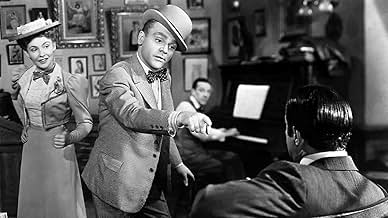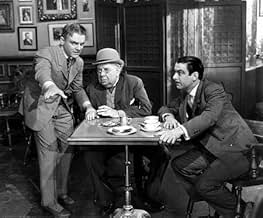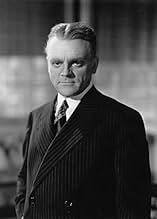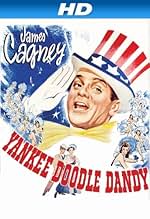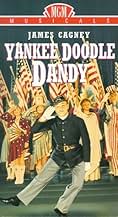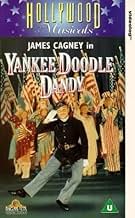IMDb-BEWERTUNG
7,6/10
17.283
IHRE BEWERTUNG
Füge eine Handlung in deiner Sprache hinzuThe life of the renowned musical composer, playwright, actor, dancer, and singer George M. Cohan.The life of the renowned musical composer, playwright, actor, dancer, and singer George M. Cohan.The life of the renowned musical composer, playwright, actor, dancer, and singer George M. Cohan.
- 3 Oscars gewonnen
- 6 Gewinne & 6 Nominierungen insgesamt
Patsy Parsons
- Josie Cohan - As a Girl of 12
- (as Patsy Lee Parsons)
Handlung
WUSSTEST DU SCHON:
- WissenswertesMany facts were changed or ignored to add to the feel of the movie. For example, the real George M. Cohan was married twice, and although his second wife's middle name was Mary, she went by her first name, Agnes. In fact, the movie deviated from the truth to such a degree that Cohan's daughter Georgette commented, "That's the kind of life Daddy would have liked to have lived."
- PatzerThe "You're A Grand Old Flag" number, supposedly takes place in the 1906 production of "George Washington Jr.," and uses multiple period flags to represent times before 1906. The Civil War flag, as an example, is correct for the time in question. However, in the final sequence characters carry, and an soft screen projection is made of, multiple 48 star flags. The 48 star flag was not introduced until 1912. In 1906, it should have been a 45 star flag. (Oklahoma was admitted to the Union in 1907, New Mexico and Arizona in 1912).
- Zitate
George M. Cohan: My mother thanks you, my father thanks you, my sister thanks you, and I thank you.
- Alternative VersionenAlso available in a computer colorized version.
- VerbindungenFeatured in The Voice That Thrilled the World (1943)
- SoundtracksThe Yankee Doodle Boy
(1904) (uncredited)
from the Broadway Show "Little Johnny Jones"
Written by George M. Cohan
Played during the opening credits
Sung and Danced by James Cagney and Chorus
Ausgewählte Rezension
`It seems it always happens
Whenever we get too high hat and sophisticated for flag-waving, some thug nation decides we're a pushover, all ready to be blackjacked. It's not long before we start looking up mighty anxiously to make sure the flag is still waving.'
So says James Cagney, as George M. Cohan, at the time of the sinking of the Lusitania in 1915. Obviously, it's a sentiment that has great relevance to our time, as well. I've always wished I could dance a patriotic dance or march down the street waving the flag. It looks like a lot of fun. The trouble is, this sort of activity is often performed to suppress what America is really about. The really great thing about our country isn't songs, flags and marches. Any country can do those things. The real great thing is that we have the right to say what we think, to debate the issues of the day and to form a consensus for action when we are in agreement about what needs to be done.
There was surely such a consensus when this film was made in 1942. There was little doubt about what needed to be done then. However, World War I seems now a particularly pointless conflict and the thought that smiling Frances Langford was singing soldiers into battle to who knows what fate is a little disturbing. And now, whenever there is a war, we are urged to join the parade and postpone debate until the issue is something not so important, like farm prices or college entrance requirements. It seems to me that the more important an issue is, the more we should be debating it. If people are going to die, we'd better make sure we are right.
From that point of view, `Yankee Doodle Dandy' can seem almost offensive. But, of course it isn't. Is a charming example of one of the thing Old Hollywood did best- the romantic biography. In this George M. is an all-right guy, an enormous bundle of energy that intimidates the stuffed shirts but causes people of substance to fall in love with him. He has a wonderful family and one of those `perfect' Hollywood wives- Mary, who doesn't even wince when he gives the song he wrote for her to another actress. He has a loyal friend and partner in Jed Harris. For some reason he's childless but still gets a thrill from performing for his beloved audiences. And, when his country needs a shot in the arm, his enthusiastic songs provide it.
Of course, he was married twice. His divorce from his first wife Ethel, was acrimonious and thus she doesn't appear in the story. `May' is a fictionalized version of his second wife Agnes. He had children but they also didn't make the cut because he was estranged from them at the time of the film. He was loathed by many of his profession for years before this because of his strong anti-union stance. His split with Jed Harris was not the gentle retirement we see here but was, at least in part because Harris had given in to the unions. And he himself loathed Franklin Roosevelt, refusing for four years to pick up the medal FDR and Congress had awarded him. Would it have been a better movie if these things were incorporated into the script? Probably not. Hollywood- and the nation at the time- was more concerned with the way things should have been than with the way they actually were.
Cagney was surely a perfect choice to play Cohan, being an Irishman who enter show business as a song and dance man, (and always considered himself primarily that). His exuberant personality also mirrors that of Cohan, who was said not to be particularly great at anything but did everything with such enthusiasm that it didn't matter. That said, I have never been a particular fan of Cagney's `puppet on a string' dance style. Dancing is supposed to be an expression of one's inner self. A puppet has no inner self.
There are many charming sequences in the film, none more so than the `cute-meet' with Mary where he's played a dottering old man in a play and she thinks he really is one until he starts showing her dance steps. Then there's his refusal by the Army because of his age. He does another dance routine to show them what they are missing. You've got to love the sequence where he and Harris, (Richard Whorf), con Cuddles Zakal into backing them. Then there's a glimpse of Cagney cute sister, Jeanne, playing Josie, Cohan's sister. We are not told why Josie is `gone' late in the film- her heart attack at age 36 was deemed too unpleasant, as was the death of Cohan's mother, (Rosemary Decamp, who was more than a decade younger than Cagney). The one death scene is that of Cohan's beloved father, played by Walter Huston, who was a Cohan protégé. Chan himself was on his deathbed as this was released, (he submitted a script which was `tactfully rejected'). He escaped his nurse to see it in a theater and gave it his approval, as we should, too.
So says James Cagney, as George M. Cohan, at the time of the sinking of the Lusitania in 1915. Obviously, it's a sentiment that has great relevance to our time, as well. I've always wished I could dance a patriotic dance or march down the street waving the flag. It looks like a lot of fun. The trouble is, this sort of activity is often performed to suppress what America is really about. The really great thing about our country isn't songs, flags and marches. Any country can do those things. The real great thing is that we have the right to say what we think, to debate the issues of the day and to form a consensus for action when we are in agreement about what needs to be done.
There was surely such a consensus when this film was made in 1942. There was little doubt about what needed to be done then. However, World War I seems now a particularly pointless conflict and the thought that smiling Frances Langford was singing soldiers into battle to who knows what fate is a little disturbing. And now, whenever there is a war, we are urged to join the parade and postpone debate until the issue is something not so important, like farm prices or college entrance requirements. It seems to me that the more important an issue is, the more we should be debating it. If people are going to die, we'd better make sure we are right.
From that point of view, `Yankee Doodle Dandy' can seem almost offensive. But, of course it isn't. Is a charming example of one of the thing Old Hollywood did best- the romantic biography. In this George M. is an all-right guy, an enormous bundle of energy that intimidates the stuffed shirts but causes people of substance to fall in love with him. He has a wonderful family and one of those `perfect' Hollywood wives- Mary, who doesn't even wince when he gives the song he wrote for her to another actress. He has a loyal friend and partner in Jed Harris. For some reason he's childless but still gets a thrill from performing for his beloved audiences. And, when his country needs a shot in the arm, his enthusiastic songs provide it.
Of course, he was married twice. His divorce from his first wife Ethel, was acrimonious and thus she doesn't appear in the story. `May' is a fictionalized version of his second wife Agnes. He had children but they also didn't make the cut because he was estranged from them at the time of the film. He was loathed by many of his profession for years before this because of his strong anti-union stance. His split with Jed Harris was not the gentle retirement we see here but was, at least in part because Harris had given in to the unions. And he himself loathed Franklin Roosevelt, refusing for four years to pick up the medal FDR and Congress had awarded him. Would it have been a better movie if these things were incorporated into the script? Probably not. Hollywood- and the nation at the time- was more concerned with the way things should have been than with the way they actually were.
Cagney was surely a perfect choice to play Cohan, being an Irishman who enter show business as a song and dance man, (and always considered himself primarily that). His exuberant personality also mirrors that of Cohan, who was said not to be particularly great at anything but did everything with such enthusiasm that it didn't matter. That said, I have never been a particular fan of Cagney's `puppet on a string' dance style. Dancing is supposed to be an expression of one's inner self. A puppet has no inner self.
There are many charming sequences in the film, none more so than the `cute-meet' with Mary where he's played a dottering old man in a play and she thinks he really is one until he starts showing her dance steps. Then there's his refusal by the Army because of his age. He does another dance routine to show them what they are missing. You've got to love the sequence where he and Harris, (Richard Whorf), con Cuddles Zakal into backing them. Then there's a glimpse of Cagney cute sister, Jeanne, playing Josie, Cohan's sister. We are not told why Josie is `gone' late in the film- her heart attack at age 36 was deemed too unpleasant, as was the death of Cohan's mother, (Rosemary Decamp, who was more than a decade younger than Cagney). The one death scene is that of Cohan's beloved father, played by Walter Huston, who was a Cohan protégé. Chan himself was on his deathbed as this was released, (he submitted a script which was `tactfully rejected'). He escaped his nurse to see it in a theater and gave it his approval, as we should, too.
Top-Auswahl
Melde dich zum Bewerten an und greife auf die Watchlist für personalisierte Empfehlungen zu.
- How long is Yankee Doodle Dandy?Powered by Alexa
Details
- Erscheinungsdatum
- Herkunftsland
- Sprache
- Auch bekannt als
- Triunfo supremo
- Drehorte
- Produktionsfirma
- Weitere beteiligte Unternehmen bei IMDbPro anzeigen
Box Office
- Bruttoertrag in den USA und Kanada
- 11.800.000 $
- Laufzeit2 Stunden 6 Minuten
- Farbe
- Seitenverhältnis
- 1.37 : 1
Zu dieser Seite beitragen
Bearbeitung vorschlagen oder fehlenden Inhalt hinzufügen

Oberste Lücke
By what name was Yankee Doodle Dandy (1942) officially released in India in English?
Antwort


